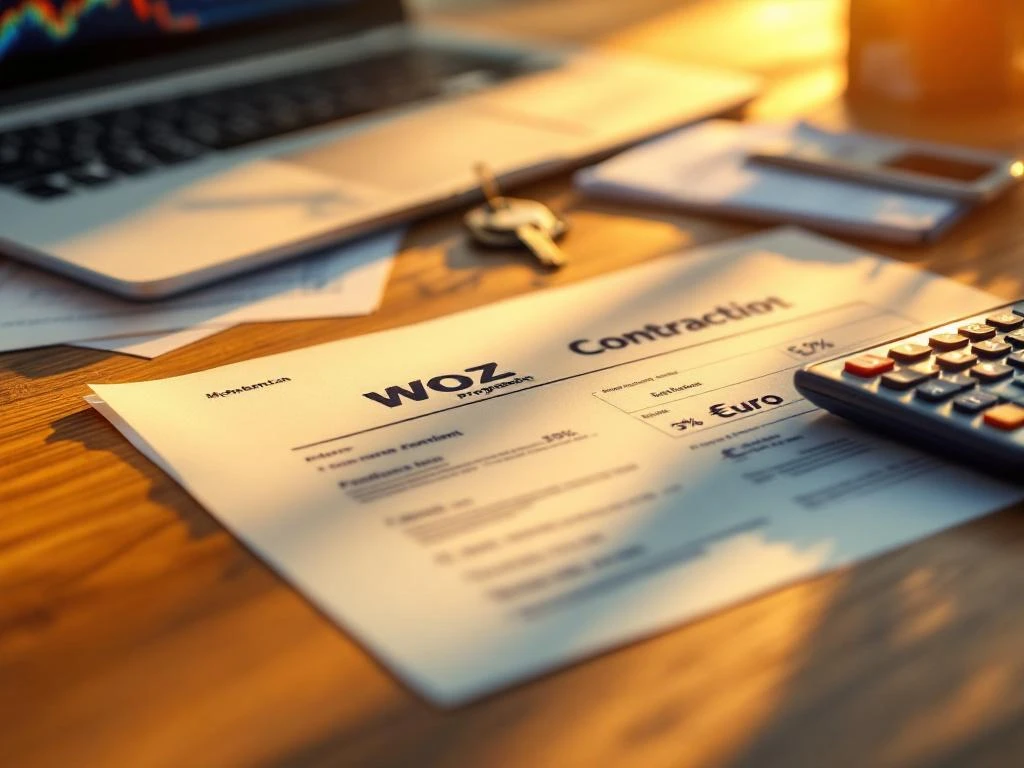As a tenant, you need to no WOZ tax to pay. This tax is only for property owners. Your landlord receives the WOZ assessment and is responsible for paying it. However, as a tenant you do pay other municipal taxes such as waste collection and the user part of the sewerage levy.
What exactly is the WOZ tax?
The WOZ tax stands for Property Valuation Act and is a municipal tax that property owners must pay. Municipalities annually determine the value of all properties within their boundaries. On the basis of this WOZ value they calculate various taxes such as property tax (OZB), water tax and income tax.
This tax exists to fund municipal services. Think of the maintenance of roads, greenery, street lighting and other public services. The amount of the WOZ tax varies by municipality and depends on the value of the property and the rate set by the municipality.
For residential property owners, the percentage is usually between 0.05% and 0.3% of the WOZ value. For non-residential properties such as office buildings, this percentage is often higher. The WOZ value is reassessed each year based on the market value on January 1 of the previous year.
Do I have to pay WOZ tax as a tenant?
No, as a tenant you do not pay any WOZ tax. This obligation lies entirely with the owner of the property. The law is very clear about this: only the person who is the legal owner of the property receives the assessment for the WOZ tax.
This applies to all types of rental property, whether you rent an apartment, row house or detached house. Even if you rent a room or are a subtenant, you don't have to worry about the WOZ tax. The main tenant or owner remains responsible.
Therefore, as a tenant, you will never receive a WOZ assessment from the municipality. If this does happen, it is probably due to an administrative error. In that case, contact your municipality immediately to have this corrected.
Who pays the WOZ tax in a rental property?
The landlord, as the owner of the property, pays the full WOZ tax. This is legally stipulated in the Property Valuation Act. At the beginning of the year, the owner receives the combined assessment stating the WOZ value and the taxes to be paid.
This responsibility lies with the landlord because he is the legal owner and benefits from increases in the value of the property. The WOZ tax is linked to ownership, not the use of the property. This principle also applies to housing associations, private landlords and real estate investors.
Landlords cannot simply pass these costs on to tenants. The rent you pay includes all costs incurred by the landlord in making the property available. This includes the WOZ tax.
Can the landlord pass on WOZ costs to me?
In principle, a landlord may not pass on WOZ costs separately to tenants. In social housing and many private rental properties, the rent is all-inclusive, with the landlord taking care of all owner charges.
However, exceptions are possible in the case of deregulated leases. Here, landlord and tenant can agree on passing on certain costs. This must then be explicitly stated in the lease. Therefore, pay close attention to what is in your contract before you sign.
With commercial and office space, pass-through is more often allowed. Commercial leases often state that the tenant reimburses certain taxes. This is usually done through service charges or as a separate item on the rent specification. For more information on renting office space and associated costs you can consult our comprehensive guide.
What municipal taxes do I pay as a tenant?
As a tenant, you do pay several other municipal taxes. The most important are the garbage tax and the user portion of the sewerage tax. These taxes are for residents, not owners.
The waste tax you pay for the collection and processing of household waste. The rate varies by municipality and sometimes depends on the number of people in your household or the amount of waste you offer. You will receive a separate assessment from the municipality for this.
For sewer charges, owners pay the owner's portion and users pay the user's portion. Tenants only pay the user part, usually a fixed amount per year. Some municipalities also levy dog tax if you have a dog, or precario tax for displaying on municipal land.
| Tax | Who pays? | What for? |
|---|---|---|
| WOZ tax | Owner/Landlord | Property value |
| Waste tax | Tenant/occupant | Waste collection and disposal |
| Sewer charge user | Tenant/occupant | Sewer system usage |
| Sewer charge owner | Owner/Landlord | Sewer system connection |
What about WOZ when renting business space?
Different rules apply when renting commercial or office space than residential space. In commercial leases, it is common for certain taxes to be passed on to the tenant. This is often done through service charges or as a separate item.
Again, the WOZ assessment remains in the owner's name, but the lease may state that the tenant reimburses these costs. This is especially common with larger commercial properties and office space for rent Amsterdam and other major cities. Therefore, always check your lease carefully before signing.
In addition to possible passing on of WOZ costs, as a tenant of commercial space you also pay user taxes. These include the user part of the OZB for non-residential properties, waste disposal charges for businesses and sewerage charges. These rates are usually higher than for private residences.
What happens to the WOZ value if I move?
If you move to another rental property, this does not affect WOZ matters. You do not have to arrange anything regarding the WOZ tax, because as a tenant you were not responsible for this tax anyway. The owner continues to receive the assessment.
However, you must adjust the municipal taxes you pay as a tenant. Report your move to both municipalities in a timely manner, so that the garbage and sewer charges are settled correctly. This usually happens automatically if you register and deregister correctly with the municipality.
Be aware that if you move halfway through the year, you may receive an after-tax assessment or refund. Municipalities often calculate taxes in proportion to the number of months you lived there. Therefore, always keep your rental contract and moving documents as proof.
Key points about WOZ and rents
The most important thing to remember is that as a tenant you must Never pay WOZ tax directly. This obligation is always on the owner of the property. Whether you rent a house, room or business premises, the WOZ assessment goes to the landlord.
However, as a tenant, you do pay other municipal taxes such as garbage tax and the user's portion of the sewer tax. You receive these in your own name and must pay them yourself. When signing a tenancy agreement, always check whether there are agreements about passing on costs, especially for commercial properties.
Do you have questions about taxes when renting office space or want to know more about what can and cannot be charged? At Co-Office, we're happy to help you find the perfect workspace with no hidden costs. Feel free to contact with us for personal advice on flexible office solutions.

